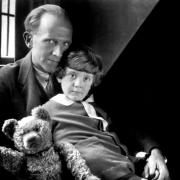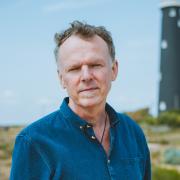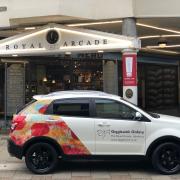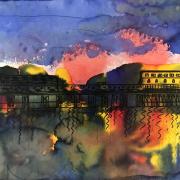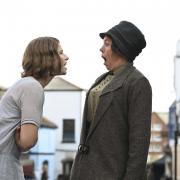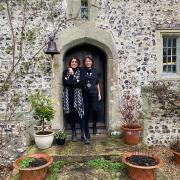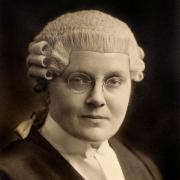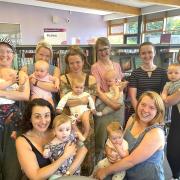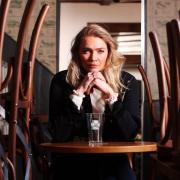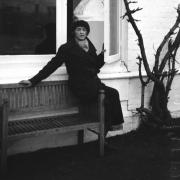Michael Fellows is just the sort of man you'd want around in an emergency. He tells Jo Steele about how he is just as much at home chairing a parish council meeting as disposing of a 1,000lb bomb while under enemy attack
Most grandfathers have a few stories to tell their grandchildren, but Michael Fellows’ stories are the stuff of James Bond novels. He has defused 1,000lb bombs aboard warships while still under attack in the Falklands War, cleared WW2 minefields in shark infested waters in the South Pacific, been held hostage and had tea with the Queen.His career as a land and subsea bomb and mine disposal clearance specialist has spanned more than 50 years. But now, at the age of 70, he is finally contemplating retirement – well, semi-retirement.On the hallway wall of his home, a cottage in the village of Yapton, near Arundel, is a frame containing his medals. They include the MBE, Distinguished Service Cross and the British Empire Medal for Gallantry.Meeting him you are struck by his calm presence. In fact, he seems to be just the sort of man you would want around in an emergency. Falklands warship bomb dramaMichael had reached the top of his profession when he left the Royal Navy in 1990, after a 35-year career. This included becoming the first man in naval history to defuse an unexploded bomb on board a warship at sea. The bomb had been dropped on HMS Antrim during the Falklands conflict. The warship was protecting another ship, the SS Canberra, and they were still under attack by enemy aircraft. It took Michael 10 hours to make the bomb safe. Twenty-four hours later he led a reconnaissance team on covert operations behind the enemy lines in Bluff Cove.Although he did not know it at the time, his work disposing of the bomb that day led to an encounter with the then Prime Minister, Margaret Thatcher. “Halfway through the disposal job, I had to talk to colleagues down the secure radio line to London to give them intelligence on what type of bomb it was. It was the first one that had not exploded during the conflict so I had to discuss my intended procedures with them as there had been no precedent. They couldn’t help me but had offered to tell Irene (Michael’s wife) where I was. I told them in no uncertain terms not to tell her. What I didn’t know was that Mrs Thatcher was listening into this conversation on a speaker in the war cabinet room.” Herald of Free EnterpriseThe Prime Minister requested a meeting with Michael on his return to England so that she could meet the man behind the colourful language. He was later invited to a victory dinner at 10 Downing Street.His leading role in bomb disposal activities during the Falklands conflict led him to become the first non- commissioned Officer in the Royal Navy to be awarded the Distinguished Service Cross. His invitation to tea at Buckingham Palace came when he was awarded the British Empire Medal for Gallantry for bomb and mine disposal and humanitarian work in Northern Ireland and Scotland.In 1987, Michael faced one of the darkest moments of his career – the sad task of recovering more than 190 bodies from the Herald of Free Enterprise car ferry after she had sunk in the English Channel. He was awarded the MBE (Military Division) for his work.Following his time as a clearance diver in the Royal Navy, he was asked to go to Somaliland following the end of its civil war to assist Medecins San Frontiers. “I was a bit reluctant to go to another war zone as an unarmed civilian. But I saw that there was a need and that I had the skills and organisational capabilities that could save lives and help to rebuild the devastated infrastructure,” says Michael. It turned out to be one of the most testing times of his career, especially when Michael and some of his men were held hostage. He managed to organise help from Djibouti and two small aircraft were sent to rescue them. “We left everything we owned behind.” He has never been back.Despite these heroics, many people in Yapton will only know Michael as the former chairman of their parish council. While some may regard the role mundane compared to his day job, he relished it. In 16 years on the council, he only missed two meetings. Happy on the home front“When I left the Navy, I decided that I really wanted to try and help put something back into the village. I spent one year on the council and the following 15 as chairman. In that time we’ve managed to change an awful lot of things and provide leisure amenities for the young and elderly. We’ve improved the playing fields and now also have an enclosed all-seasons kick-about area and a children’s zone. The elderly have facilities inside the village hall. I really enjoyed my time on the council.”Michael retired from the council three years ago. One of his leaving presents was to have a new road in the village named after him – Fellows Gardens. Now a grandfather-of-three, he is very happy living in Sussex. “I originate from Littlehampton. It’s a beautiful area here. We’ve got the seafront, the River Arun, a nice climate and the South Downs behind us. It’s a beautiful part of the world. The sun seems to shine on us here, it’s a lovely spot.”Michael remains one of the world’s leading authorities on land and subsea unexploded munitions location and disposal. He has run his own bomb disposal and mine clearance business, Fellows International, for the past 17 years. He started it from the study of his cottage and he now has offices at Ford Lane Business Park. The company has recently become a PLC and Michael is due to retire soon from full-time work to become chairman.Fellows International works both overseas and in the UK. It is involved in helping to make sure sites for the 2012 London Olympics are cleared of any unexploded munitions hazards. They have also been surveying and clearing areas of any unexploded bombs and mines from WW2 for new offshore wind farms and oil / gas pipelines.Abroad, the company has worked in countries including Iraq, Vietnam, Somalia, Angola. “For the last three years we’ve been predominantly in northern Iraq in the Kurdistan region along the Iranian, Syrian and Turkish borders. We have a contract with the regional government to clear three million square metres of land contaminated by mines and the unexploded relics of war which is going to take us another two or three years. It is possibly the most mined country in the whole world. It’s horrendous.”At his office he has a grisly museum of some of the landmines he has come across. He describes one, a small plastic, minimum-metal one, with tiny bells and coloured glass beads attached, as a nasty piece of work. It was designed by Saddam Hussein’s henchmen to maim Kurdish children.Michael handpicks all of the men who work at his company. They are all ex-military personnel used to working in adverse environmental and social conditions. They work with and train the local people in each country they work in. For example, they have 160 Kurdish staff in Northern Iraq, trained to United Nations international mine action standards. 70th birthday in minefieldMichael has only had one major accident himself. You can just make out a scar running down the left side of his forehead. It was caused, not by the detonation of any explosives, but a high wind in Scotland that flipped the Land Rover he was travelling in down the side of a hill and into oncoming traffic. Last August, while in Kurdistan he fell ill after contracting cutaneous leishmaniasis, a parasitic disease transmitted through the bites of certain species of sand-fly. “I didn’t even realise I had been bitten. I came home feeling a bit rough and went to see our local doctor with a large lump on my neck. Knowing where I had returned from they decided straight away do biopsies.” The disease caused him to lose almost two stone in weight in four weeks.He spent his 70th birthday in the minefields in Kurdistan and this month (February) turns 71. He says retiring from full-time work will not mean he puts his feet up. “I’ve met some very interesting people in my life including the Queen, the last three prime ministers, foreign Kings, Queens and heads of state. My two careers and time on the local council have been very gratifying and rewarding in many ways. I could not have survived without Irene’s blessing and support.“I love crisis management, need to keep my brain active and I’m one of the few people around that probably know an awful lot still about WW1 and WW2 conventional and chemical bombs and munitions. I’ve got expertise that is still required and I’ll remain as chairman of the company for as long as I’m needed. But I’ll have a bit more time with Irene travelling around the world visiting the few places still left on my ‘to visit’ list. I’m reluctantly semi-retiring.”



